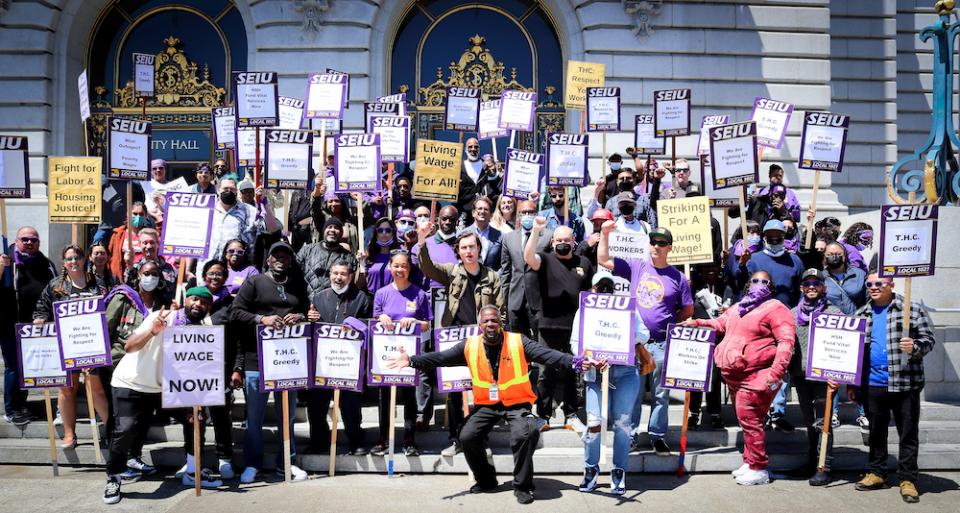
STRIKE: 300 Tenderloin Housing Clinic workers who support 24 of San Francisco’s SRO hotels are set to hit the picket line at 8 am on July 27
After months of bargaining, and without an adequate investment in the workforce by city leaders, workers are forced to take this step
ADVISORY for Wednesday, July 27
Contact: Andrew Baker; 510-679-8420
andrew.baker@seiu1021.org
STRIKE: 300 Tenderloin Housing Clinic workers who support
24 of San Francisco’s SRO hotels are set to hit the picket line
at 8 am on July 27
After months of bargaining, and without adequate investment
in the workforce by city leaders, workers are forced to take this
step
(San Francisco, CA) Tenderloin Housing Clinic
(THC) workers are planning a 24-hour strike on Wednesday, July 27
as efforts to secure a new contract with management continue to
drag on. Workers have been struggling with years of turnover,
burnout, and short-staffing—all of which are fueled by woefully
inadequate compensation. As inflation and cost of living in San
Francisco continue to climb, workers have scheduled a
first-of-its-kind strike at a supportive housing nonprofit.
“We’re disappointed that it’s come to this point but we have seen
a lack of urgency from management to address the causes of
burnout and turnover, which is well within their power. At the
same time, we’re still awaiting clarity from the City and County
and Department of Homelessness and Supportive Housing around
proposed funding for badly-needed wage increases,” said Evan
Oravec, a Community Organizer at Tenderloin Housing Clinic and
the SEIU 1021 Chapter President. “A budget is a moral document,
and how San Francisco allocates its resources tells us a lot
about the priorities of our elected leaders. Improving our
homelessness and supportive housing system starts with investing
in the people delivering those services at every level—not only
the case managers, but the desk clerks, janitors, and beyond.”
- WHAT: Hundreds of THC workers go on a 24 hour strike
- WHEN: There will be a rally with community allies and supporters on 7/27 at 11 am. This will be the ideal time for 1-on-1 interviews with workers and will have the best visuals. The picket line will be up from 8 am – 8 pm on Wednesday.
- WHERE: Tenderloin Housing Clinic offices at 449 Turk St., San Francisco, CA
- VISUALS: The 11 am rally will have the best visuals of the day. You can expect workers and community allies holding picket signs, wearing union shirts, marching, chanting, and giving speeches.
Workers say two things need to happen. First, Randy Shaw
and THC management must be transparent with their finances and
address staff proposals to improve employee mental health,
burnout, and turnover—all of which have an impact on resident
services. Second, because THC receives its funding from the City
and County, workers are calling on elected leaders to allocate
enough money to address wage compaction and provide meaningful
wage increases for the entire workforce.
The workers’ positions are supported by
a May 2022 report from the City Controller’s office which
found that, “Low wage levels have led to difficulty hiring and
high turnover, impacting client services and service provider
stability. Gaps in staffing can create unsafe environments for
participants and staff. Absent action, these challenges will
continue to impact service levels, may create unsafe conditions
and are likely to impede the implementation of major adopted
enhancements, including for homeless services and childcare
programs.”
Background
THC staff does critical work to keep San Francisco’s homelessness
and supportive housing system functioning. They work as desk
clerks, janitors, case workers, maintenance staff, and more at 24
of the city’s Single-Room Occupancy hotels (SROs).
Negotiations began with a rocky start. THC made a number of
proposals aimed at undermining their employees’ union rather than
addressing workplace issues. After a series of informational
pickets and a delegation to management, those proposals were
taken off the table but management still failed to give adequate
responses to the issues being brought by workers.
THC workers voted overwhelmingly by over 99% earlier this year to
authorize their bargaining team to call for a strike if
sufficient progress wasn’t made at the bargaining
table.
Typically, wage adjustments for city-funded nonprofit workers are
governed by two policy mechanisms—the Cost of Doing Business
(CODB) and the Minimum Compensation Ordinance (MCO). The CODB
allocation typically provides city-funded nonprofits with an
annual funding increase to meet wage and market pressures. The
MCO establishes hourly wage level requirements for three sectors
of City contract workers: for-profit contractors, nonprofit
contractors, and public entities. While both of these policies
have historically served a valuable purpose, they have not kept
up with the needs of nonprofit workers providing these invaluable
community services.

